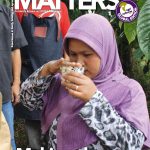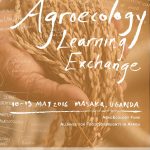31 downloads
Title of document: Agroecology: Key Concepts, Principles and Practices. Main learning points from Training courses on Agroecology in Solo, Indonesia (5-9 June 2013) and Lusaka, Zambia (20-24 April 2015). Authors: compiled by Third World Network (TWN) and Sociedad Cientifica Latinoamericana de Agroeccologia (SOCLA) Ministry/Government Agency/Organisation: Third World Network (TWN) and Sociedad Cientifica Latinoamericana de Agroeccologia (SOCLA) Date: 2015 Geographic focus: Worldwide Summary: Recognizing the urgent need for capacity building on agroecology, the Third World Network (TWN) organized two training courses to equip key actors with a comprehensive understanding of the principles and concepts of agroecology and to provide evidence of success through illustrative examples. The first was a Southeast Asian Training Course on Agroecology, organized together with Aliansi Petani (API) in Solo, Indonesia from 5-9 June 2013. The second was a Southern and Eastern African Agroecology Knowledge and Skills Sharing, organized with the African Centre for Biodiversity (ACB), in collaboration with the Kasisi Agricultural Training Centre, in Lusaka, Zambia from 20-24 April 2015. The resource persons were Prf. Miguel Altieri and Dr. Clara Nicholls, from the University of California, Berkeley, USA and the Latin American Scientific Society of Agroecology (SOCLA). Participants at both courses included farmers and farmer’s leaders, representatives of farmer’s organisations and civil society organisations working on agroecology/ecological agriculture, as well as government officials. This documents is a summary compiled by TWN staff of the main learning points from the lectures given during the training courses, serving as a useful resource booklet on the key concepts, principles and practices of agroecology. Miguel Altieri provided valuable inputs. Read More
1 download
Title of document: Report of the International Symposium on Agroecology in China Authors: Food and Agriculture Organization (FAO) Ministry/Government Agency/Organisation: Food and Agriculture Organization (FAO) Date: 29-31 August 2016 Location: Kunming, Yunnan, China Geographic focus: China Summary: In September 2014 the Food and Agriculture Organization of the United Nations (FAO) convened the International Symposium on Agroecology for Food Security and Nutrition. This was followed in 2015 by three regional meetings in Brazil, Senegal and Thailand. These meetings brought together stakeholders from academia, policy and civil society to facilitate better understanding of the role of agroecology in contributing to food security and nutrition. The meetings confirmed that FAO’s approach to agroecology should be based on regional and local realities as well as economic, social and environmental conditions. In order to continue to develop this regional approach a further symposium on agroecology the International Symposium on Agroecology for Sustainable Agriculture and Food Systems in China was organized by the Chinese Academy of Agricultural Sciences (CAAS), FAO, and Yunnan Academy of Agricultural Sciences (YAAS), with the support of the Government of France. Read More

16 downloads
Title of document: Farming Matters - Making the case for Agroecology Support: Magazine Issue: N° 32.3 Publisher: Farming Matters is published by ILEIA, the centre for learning on sustainable agriculture. ILEIA is a member of the AgriCultures Network, a global network of organisations that shares knowledge on agroecology and family farming. www.farmingmatters.org Date of publication: September 2016 Geographic focus: World wide Summary: Agroecology is ever more present in our food and farming system. In recent years, this approach to farming and food has gained visibility and recognition among food producers, scientists, citizens and policy makers alike. It is heartening that farmers increasingly take up agroecological practices, while both social movements and multilateral institutions such as the FAO develop policies on agroecology. However, the transition to a fundamentally different food system still has a long way to go. It cannot be stressed enough that the way our food system is currently organised is incompatible with principles of equity, peace, biodiversity conservation and economic and environmental sustainability. Perverse subsidies supporting input intensive production systems and production chains that benefit a few agro-input providers and retailers, in the context of an urgent need to address climate change, biodiversity loss and malnutrition, point to the need for radical change. Here lies the potential of agroecology as a food system that can contribute to solutions for many of these challenges. But, while many successful agroecological examples exist, it is generally not yet regarded as the most effective food system. This tension is partly explained by the way society looks at impact. The multifaceted benefits of agroecology cannot be measured through the traditional ‘productionist’ lens. This issue of Farming Matters explores how to demonstrate the critical role agroecology can play in responding to the challenges of our time. Read More
15 downloads
Title of document: "Getting into a bind": How trade and investment regime blocks the development of Agroecology and access to land Authors: Nathalia Carrau and Martin Drago Ministry/Government Agency/Organisation: Friends of the Earth Year of publication: October 2016 Geographic focus: Worldwide Summary: There are multiple unregistered impacts, which are made invisible or inadequately reported, that prove the agribusiness led agrifood system is deeply unfair in many ways and fails to deliver a solution for the inter connected global crises of hunger, poverty and environmental destruction – crises that urgently need to be addressed by international governance spaces. This paper argues that the current trade and investment framework promotes agribusiness and in fact aggravates its impacts because, it also blocks the development of agroecology and food sovereignty. The negative impacts of the prevailing trade and investment model, such as increasing hunger and poverty, are not measured or addressed because the hegemonic theoretical, conceptual and symbolic framework is dominated by the rationale of the capitalist system that gives value to food and farming based strictly on its economic profitability. This paper aims to contrast the logic and rationale behind investing in agribusiness vs investing in agroecology. Read More
1 download
Title of document: Making Sense (and Cents) of Food and Nature. A media guide to covering agro-ecology and food sovereignty Authors: Jeff Rutherford Ministry/Government Agency/Organisation: Internews’Earth Journalism Network Year of publication: not dated Geographic focus: Worldwide Summary: We know there’s something wrong with the food. What we don’t know: It doesn’t have to be that way. People are increasingly aware, though still woefully misinformed, that there is something wrong with how food works in our world. But instead of breeding action and commitment to finding solutions, this awareness risks breeding fatalism and complacency. Exciting advances in agro-ecology worldwide offer hope and avenues for action, but the message is not getting out. This short media guide aims at orienting journalism towards a better Agroecology coverage and helping seeing food through journalistic lens. Read More
12 downloads
Title of document: Agroecology and Sustainable Development Authors: Jean Vettraino with support from Jean-Noël Menard and Vincent Minouflet Ministry/Government Agency/Organisation: International Action and Advocacy Department (DAPI) of Secours Catholique-Caritas France Year of publication: January 2017 Geographic focus: worldwide Summary: “Understanding the cornerstones of agroecology” requires “a sustained and significant collective effort, comparable to the efforts that went into conquering space. (...) Without doubt, the future of humanity depends far greater on this research than any programme looking at IT, electronics or telecommunications.” This report will primarily focus on agroecology projects and the views of partners in the Global South, projects and partners supported by Secours Catholique-Caritas Europe (SCCF). The wide range of practices are tailored to providing local solutions for sustainable agriculture in myriad different regions. All the initiatives are built on the principles of empowerment, action, resilience and integration of the social dimension. These characteristics stem from the desire to see a profound change in our food and agriculture systems, moving towards diversified agroecological systems. Read More
1 download
Title of document: Why a Complexe Food System is Needed, Now Authors: Dr. Hans R. Herren Ministry/Government Agency/Organisation: Millennium Institute Founder and Biovision Foundation Year of publication: 2016 Geographic focus: Worldwide Summary: This document presents various options for a sustainable agriculture and food system. It adresses the obstacles preventing the transformation from moving forward and how avoiding them. Read More
8 downloads
Title of document: Agroecological practices: Transforming the dominant agro-food system? Authors: Les Levidow Ministry/Government Agency/Organisation: Open University Year of publication: 10th of November 2016 Geographic focus: Worldwide Summary: This document introduces the concept of Agroecology and how it can transform the dominant agro-food system through various Agroecological practices. Read More

10 downloads
Title of document: Proceedings of the Agroecology Learning Exchange 2016 in Masaka, Uganda Authors: Janneke Bruil, Jessica Milgroom, Romée Marchand (all from ILEIA) with support from Daniel Moss (AEF). Ministry/Government Agency/Organisation: AgroEcology Fund (AEF) and the Alliance for Food Sovereignty in Africa (AFSA) Date: From 10th to the 13th of May 2016 Location: St. Jude’s Family Projects, Masaka, Uganda Geographic focus: Uganda Summary: “Agroecology is a process. You cannot expect a process to be perfect immediately. But once you make a step, you are moving.”—Jowelia Mukiibi, farmer, Uganda From the 10th to the 13th of May 2016, the AgroEcology Fund (AEF) and the Alliance for Food Sovereignty in Africa (AFSA) brought together 70 people representing 30 organizations to share experiences and ideas about amplifying agroecology. True to its name, this Learning Exchange aimed to facilitate learning and crosspollination of ideas among grantees, advisors and funders of the AEF, and to explore synergies to further the global agroecology movement. The meeting was held at St. Jude’s Family Projects, a demonstration farm and training center for agroecology based in Masaka, Uganda. This report aims to capture the proceedings as well as the rich and valuable sharing that took place at the Exchange. Read More
20 downloads
Title of document: Proceedings of the National Thematic Workshop on "What performance Indicators for Assessing Agroecology Impacts ?" Authors: Pierre Ferrand and Dr. Saythong Vilayvong Ministry/Government Agency/Organisation: ALiSEA Date: 29th November 2016 Location: LANITH, Vientiane, Laos Geographic focus: Laos Summary: Agro-ecological approaches are seen as convincing and evidence-based alternatives towards sustainable agriculture. They clearly aim at strengthening innovation capacity of family farms, as well as the recognition of their contribution to food sovereignty in the region. They cover technical, economic, societal and policy dimensions of agricultural production respectful of environment. They also contribute to poverty alleviation, food security, climate change mitigation and adaptation However, relying on conventional metrics to measure the performance of farming systems, it is hard to make the case for agroecology. To understand the impact of agroecology requires assessing the performance through a different lens. This report presents the main findings of the discussions held during the 1 day workshop addressing performance indicators for agroecology impacts in Vientiane, Laos, on the 9th of November 2016. Read More

 Asia & Mekong Region
Asia & Mekong Region  Cambodia
Cambodia  Laos
Laos  Myanmar
Myanmar  Other
Other  Vietnam
Vietnam